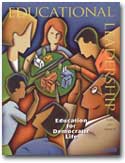Recently the Washington Post published the U.S. Citizenship Test that new immigrants must take to gain the rights guaranteed by the U.S. Constitution. One question read: Why did the Puritans come to the New World? Answer: For religious freedom.
Immediately, informed citizens fired off letters to the editor protesting that the test was simplistic. Puritans were not seeking religious freedom for all, one writer noted, but were in fact seeking to establish their religion for all. As the recent movie of Arthur Miller's The Crucible reminds us, a few of the "First Dissenters" believed that disagreement with the powers that be could be a hanging offense.
Ironic, isn't it, that 300 years later, we, like our foreparents, extol the freedoms of democratic life while expressing intolerance of others' views? Ironic, too, that we have forgotten that the struggle to maintain the right to dissent stands on a commitment to listening to those who disagree with us.
A school administrator recently described a phenomenon she called "tyranny of the minority." Part of her job as a public relations director is to "put out fires before they become media bonanzas." Another part is to listen to the various publics whose children attend public schools. Increasingly, groups and families not only request the right to have their children opt out of a particular activity, but also demand the right to prescribe what other children should and should not learn. If the two sides of the controversy face off, debate becomes antagonistic, and a solution that would respect each side's rights drifts even farther away.
On a recent visit to ASCD headquarters, Mike Rose, author of Possible Lives, noted a similar "mind-numbing conundrum" concerning public debate about educational issues. "Why is it," he asked, "in the history of American thought about education, we can't seem to think in complex ways? It's always this approach or that approach, with this tremendous demonizing of the other side. So much of our public talk about national issues is not reflective. It is not about trying out ideas and observing what is happening; it is debate in its most reduced sense: crossfire, sound bites, MTV."
In this issue of Educational Leadership, David Tyack (p. 22) reminds us that it will take more than the schools' efforts to turn a nation of civic couch potatoes into a society where there is high voter turnout, high participation in organizational life, and trust of government. He believes adults must first engage in debate and deliberation, negotiation and compromise, and a search for shared values.
Mark Gerzon (p. 6) says for that to happen, we need to talk with those who do not think the way we do. As for schools, they need to "build conflict in" instead of trying to avoid it at all costs. "If we adults care about what children learn, then we'd better pay attention to how we handle our differences," he warns us. "What affects our children most is what we do, not what we say."
Several authors in this issue point out the need for civic action and public involvement, as well as the need for civil discourse about civil matters. Others give us specifics about how to increase participation of students and adults in local districts.
In April, ASCD will participate in the Citizen Service Summit, which will launch a nationwide strategy for citizen service and community leadership. This summit, to be held in Philadelphia—the birthplace of the Bill of Rights—will bring together the current and past presidents of the United States and citizen leaders from 100 communities and 500 partner organizations. Up for discussion is the kind of education that will prepare the coming generation for employment, fulfilment, and good citizenship. (See the Contemporary Issues feature, Rethinking the Purpose of Education, p. 30.) Participants will also propose ways to encourage mentoring and service learning, and to connect citizens to solve problems.
As Suzanne Tacheny (p. 49) reminds us, polls and surveys of public opinion—and even elections—are not enough to guide policy and practices in a civil society. It is our rational discourse about our differences—in ways that are not polarizing—that will beget the tolerance our increasingly diverse nation needs.
